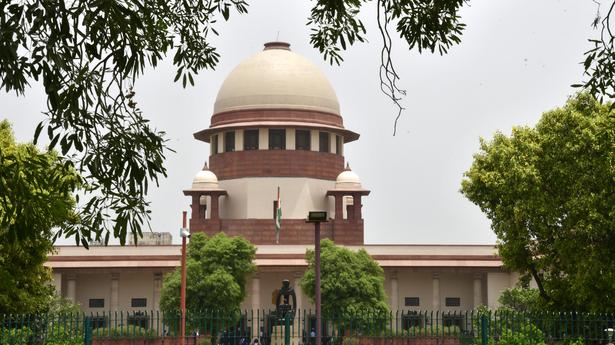
Long cohabitation presumes marriage: Supreme Court
The Hindu
‘The law presumes in favour of marriage and not in a state of concubinage’
The law presumes a couple to be married if they have lived together for long as man and wife, the Supreme Court said in a judgment on Monday.
A Bench of Justices S. Abdul Nazeer and Vikram Nath said “the law presumes in favour of marriage and not in a state of concubinage”.
Though the presumption of marriage could be challenged, it would be a “heavy burden” for the one who seeks to deprive the relationship of a legal origin. The challenger has to prove that the couple is not married, Justice Nazeer, who authored the judgment, observed.
The judgment came in an appeal filed on a suit of partition from Kerala. Four sons and their heirs had coparcenary rights over a property. One of them had lived with a woman for years and had a son. The question before the courts was whether this son should be treated as an illegitimate child. The rival side contended that there were no documents or evidence to prove that the man and woman had tied the knot. They argued that a child from such a union had no right over a coparcenary property.
The trial court however ruled in favour of the couple’s son. It presumed that his parents were married. It passed a preliminary decree for partition giving him a share of the property. The Kerala High Court, however, reversed the decision, saying the “marriage” between his parents was not valid.
The Supreme Court set aside the High Court decision, saying it would be almost impossible to find documentary evidence of a marriage which took place 50 years before the filing of the partition suit. Besides, there was evidence that the man had made periodic payments to the woman.
“A strong presumption arises in favour of wedlock where two partners have lived together for a long spell as husband and wife,” the court quoted from its past judgments.

“Writing, in general, is a very solitary process,” says Yauvanika Chopra, Associate Director at The New India Foundation (NIF), which, earlier this year, announced the 12th edition of its NIF Book Fellowships for research and scholarship about Indian history after Independence. While authors, in general, are built for it, it can still get very lonely, says Chopra, pointing out that the fellowship’s community support is as valuable as the monetary benefits it offers. “There is a solid community of NIF fellows, trustees, language experts, jury members, all of whom are incredibly competent,” she says. “They really help make authors feel supported from manuscript to publication, so you never feel like you’re struggling through isolation.”

Several principals of government and private schools in Delhi on Tuesday said the Directorate of Education (DoE) circular from a day earlier, directing schools to conduct classes in ‘hybrid’ mode, had caused confusion regarding day-to-day operations as they did not know how many students would return to school from Wednesday and how would teachers instruct in two modes — online and in person — at once. The DoE circular on Monday had also stated that the option to “exercise online mode of education, wherever available, shall vest with the students and their guardians”. Several schoolteachers also expressed confusion regarding the DoE order. A government schoolteacher said he was unsure of how to cope with the resumption of physical classes, given that the order directing government offices to ensure that 50% of the employees work from home is still in place. On Monday, the Commission for Air Quality Management in the National Capital Region and Adjoining Areas (CAQM) had, on the orders of the Supreme Court, directed schools in Delhi-NCR to shift classes to the hybrid mode, following which the DoE had issued the circular. The court had urged the Centre’s pollution watchdog to consider restarting physical classes due to many students missing out on the mid-day meals and lacking the necessary means to attend classes online. The CAQM had, on November 20, asked schools in Delhi-NCR to shift to the online mode of teaching.









